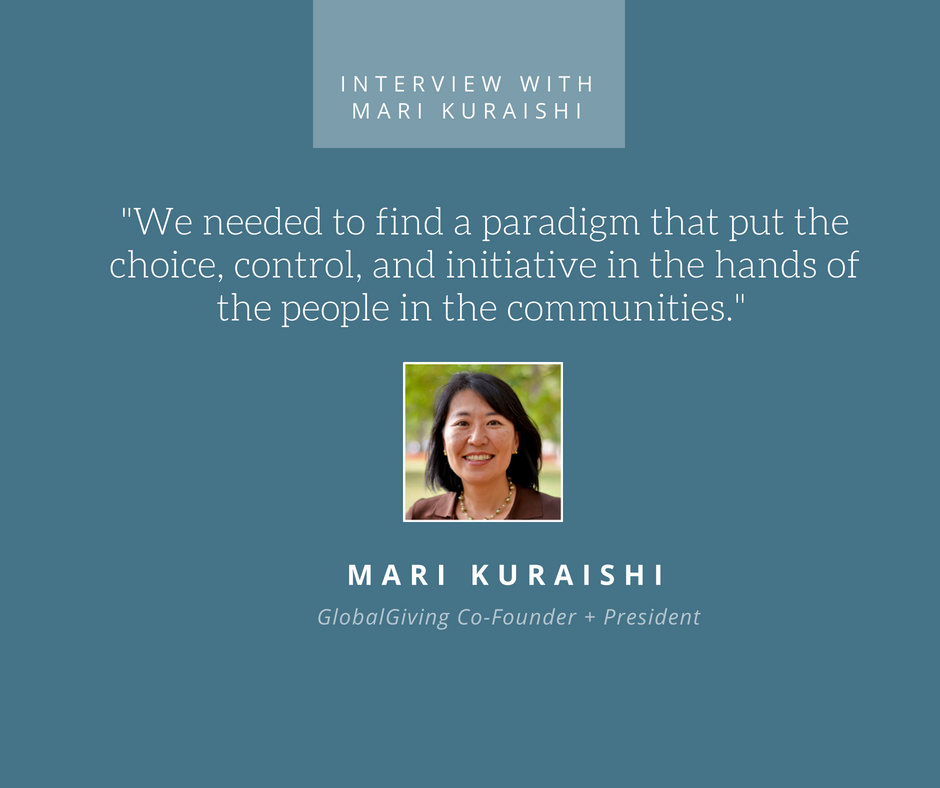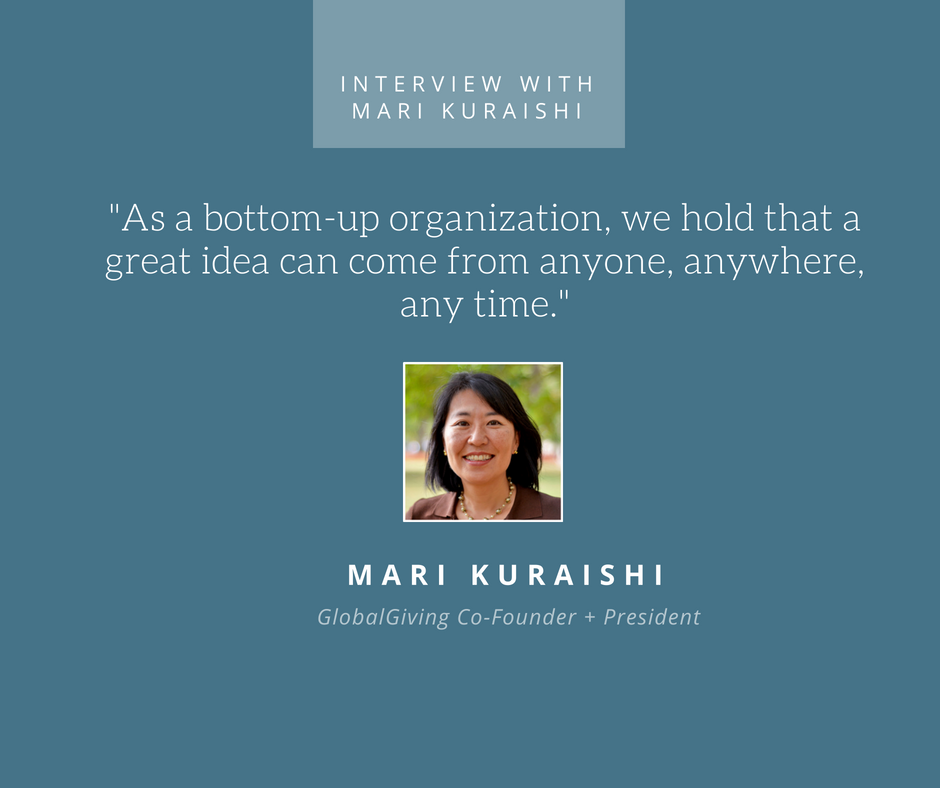Mari Kuraishi, who founded GlobalGiving with her husband Dennis Whittle in 2002, explores the past and future of GlobalGiving in this interview with GuideStar’s Gabe Cohen. Mari plans to step down from her current position as GlobalGiving president in October.
A: It started with both me and Dennis working at the World Bank, which is one of the biggest players in international development—certainly well funded, staffed with some of the most technically expert people in the field—observing a couple of things. One is that there were limits to what could be done to eradicate poverty by working solely with the governments and the World Bank. And many actors in foreign aid, if they don’t work through governments, still have to work with governments. So that’s one observation: not everything can be handled by the public sector.
Two, there were also countries where governments were not as effective as they might be, and therefore the idea of channeling aid through government makes the whole venture even more questionable.
Lastly, we looked at the way aid worked, with money and expertise coming from outside the country. Essentially what that meant was that World Bank staff would design programs and set everything up and handshake at the point of loan, and then the government would take the money. There would be no capacity, or interest, even, on the other end, to really treat the project as a living endeavor that would have to be modified as reality changed.
A: This is what pushed us out of the official aid realm and into the bottom-up world. It was a question how do you ensure that the people on the ground who are most effective actually have skin in the game and care to make it work, because the best-laid plans never actually materialize in the way you intend them to. And the only way we can discover that they’re not working and why they’re not working and how they need to be changed is local information. So we needed to find a paradigm that put the choice, control, and initiative in the hands of the people in the communities. And it seemed like the right time to set something up, because it was the beginning of the first dot-com boom.

A: Partly because we knew the old system, the status quo, and how you get the best possible outcomes out of the status quo. We knew how to run things through that system, and not that many people were in a position—well, there are a lot of people working at the World Bank, obviously, but relative to the whole population—there was a very small number of people who knew how the system worked from the inside.
Two, we had spent two or three years looking at the whole space of international development, because we had been in charge of corporate strategy for the World Bank, so we had a feel for all of the actors in the space, and therefore had a feel for what was missing.
In other ways, we were uniquely unqualified to start up GlobalGiving. Neither of us had any technology background—we couldn’t build anything. We couldn’t build a web page. Neither of us had engaged in sales, neither of us had engaged in marketing—you don’t have to when you work for a quasi-monopoly that has its own source of funding. So, really, in some ways, we had no idea how to do a start-up.
A: Absolutely. There’s luck—luck in a sort of meta way—in that the fact that we came from the World Bank meant that we’d been paid relatively well up to that point. We started in 2001 at what we thought was a dot-com boom but turned out to be the dot-com bust. Which meant that for a couple of years, there was no funding to be had anywhere. It wasn’t just the seed money drying up, it was foundations were kinda like, “Five % is dipping down, because the whole economy is going south.” So we were lucky that we could gut it out and not take a salary and just kinda grind down despite the fact that it didn’t look very promising for many years.
A: We had a financing deal that we put together at the height of the dot-com boom. It was $3 million, to get started. The money was from IFC, the private sector arm of the World Bank. They said, “This looks good. Let’s try it.” And we were about to sign, except the IFC, because of its association with the World Bank, said, “Well, this is all great, your plan sounds great, we’re behind you, but our colleagues at the World Bank asked us to include this clause, which said that we reserve the right to review any partnerships that you enter into.” And that they would have 10 business days to say yes or no. And we looked at that and thought, “We can’t say yes to this. This is insane. If we let them review every single partnership we enter into, we’re never going to be able to get going.” So we turned it down. And when the dot-com bust came to be, I was like, “That was so totally the wrong decision. We should have taken that money.” In retrospect, had we taken that money, we would be a very different entity. And I’m not sure that as a very different entity, we would have survived.
A: The core values were something that we felt we had lived by for a long time, but we only put together formally in 2006 or 7 or so. The management team did some work but then handed it over to the whole team and said, “Here, you guys live here and work here. Tell us how you would put it all together.” They’re the ones who came up with the exact words of “Always Open” or “Listen, Act, Learn. Repeat.”
We went through an exercise to get there that basically said, “Look, there are a lot of things that are threshold values—honesty or trustworthiness or whatever.” What we really wanted were values that could guide our behavior day to day. We’ve tried to create an organization that doesn’t have many rules or processes or checklists or whatever, and so people, justifiably so, said, “Not having rules is fine, but what do I do? What am I supposed to do?”
So then we came up with the values in an attempt to guide people’s behavior day to day. Always Open is a value that enshrines that part of our theory of change, that says that, as a bottom-up organization, we hold that a great idea can come from anyone, anywhere, any time. Which means that if some nonprofit based in Zimbabwe calls up, we take that call as seriously as some potential high net worth donor who wants to give through our site. And enshrining that value of Always Open guides the person who’s answering the phone call.

Listen, Act, Learn. Repeat, which is probably the first among all our values, basically outlines how we operate, which is that we try stuff and learn from it and iterate, and we don’t wait until things are perfect. I guess it’s a little analogous to Facebook’s “Break things.”
We hold that learning happens when you act, not when you just read a book or listen, and because the first passthrough is likely to be wrong, you have to be able to learn really quickly and turn around and start over again. Today, in the context of Agile and Lean Start-up, it all seems that of course that’s the way you should operate. But when we were starting out, that wasn’t the way … versioning was still a big deal. The idea that you would quickly throw stuff up and fix it, rather than design the perfect thing, was pretty alien. So trying to find that value really did give guidance to people as to how they should behave in the office.
Committed to WOW has to do really with our feeling that many of the customers we serve, which include extremely small nonprofits in the developing world, have never been, at least in the international aid construct, been treated like they are the potential source of creativity and dynamism. But they deserve to be treated that way, and that’s why Committed to WOW. It’s also based on our hunch that customer service is what distinguishes our brand and therefore we should want every interaction to lead to someone saying, “Wow.”
A: Mostly because I feel like the organization is in the right place. We had a great year last year, we’ve been able to set aside some money for our war chest, this year revenues and expenses look really good. So I am handing over an organization that is sorta firing on all cylinders, has play-around money for the next CEO. And I want to leave the organization positioned for success, and it’s also the right time for me to leave because if I stay much longer, the organization will get too closely associated with me, and it will become sort of the Mari show, and not the GlobalGiving show. And, finally, an organization needs to be able to make that sort of transition away from the founder. It’s just one of those rites of passage that allow an organization to grow up. And if I put it off much longer, it’s going to be harder.
A: Yeah, probably on the board.
A: I think the candidate could come from any number of fields. Could come from international development, the way Dennis and I did, or could come from tech, could come from the nonprofit world, could come from philanthropy, from CSR, because we touch upon all those fields substantively. But I think the one thing that could make the difference between being a success or not successful candidate is the ability to admit that you’re wrong. Because our whole organization operates on the idea that we rely on doing something and discovering quickly if it’s wrong and being able to change course. If you can’t admit you’re wrong, you can’t change course, and the whole thing kind of falls apart.
A: I don’t know is the honest answer.
A: Yes, exactly, from Frank Fukuyama. The End of History guy. That’s always an option. As is getting into cooking or who knows … what else could I do?
A: I’m not necessarily planning to take time off, but I do want to take the time to find the right spot. So … I don’t know now. I might know by December 31, when I go off payroll here. Orrrr I might not know. In which case I will need to take some time off.
This post has been edited for length and clarity. You can find the full version in two parts on the GuideStar Blog. [Read Part 1. Read Part 2.]
Find exactly what you're looking for in our Learn Library by searching for specific words or phrases related to the content you need.